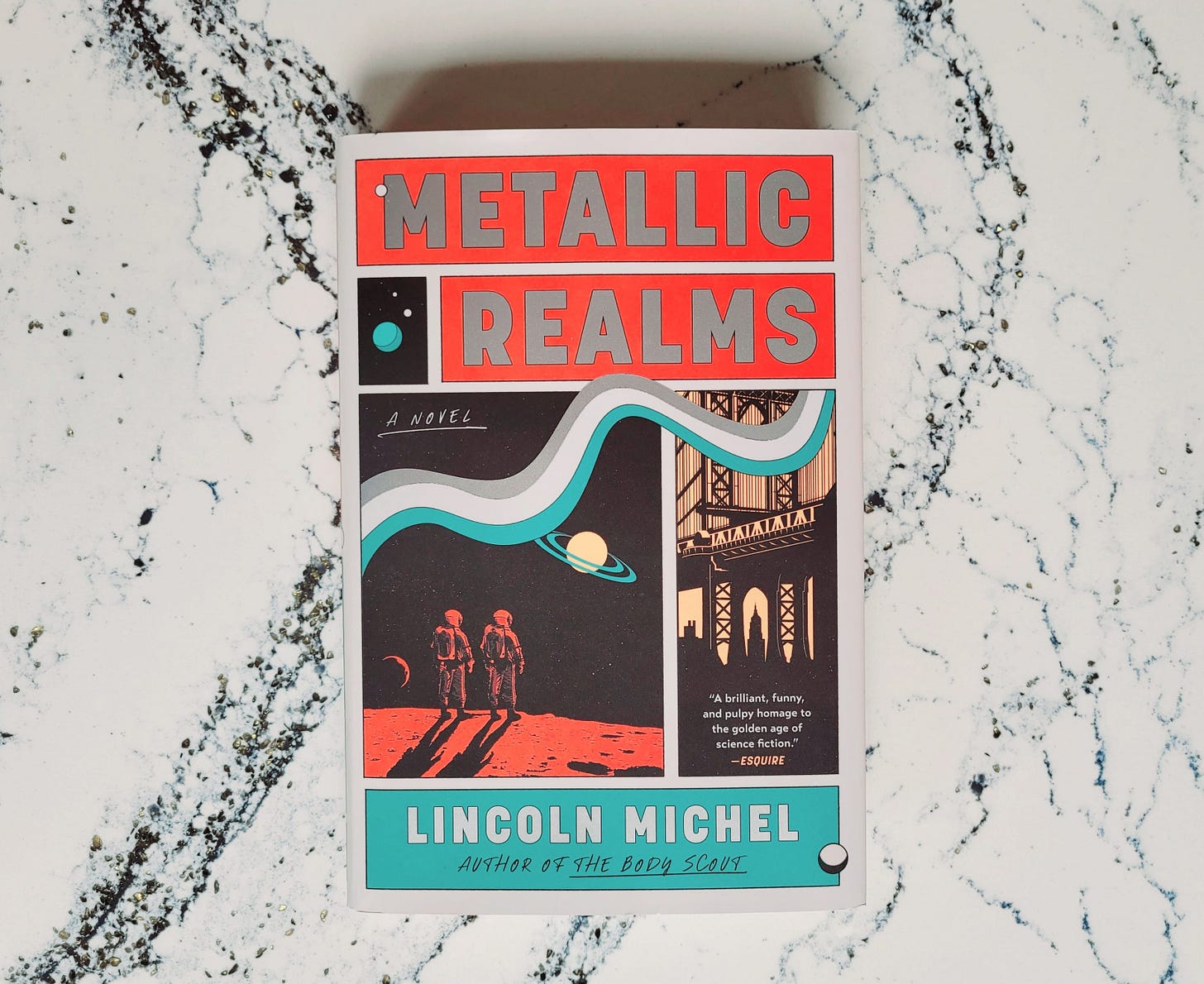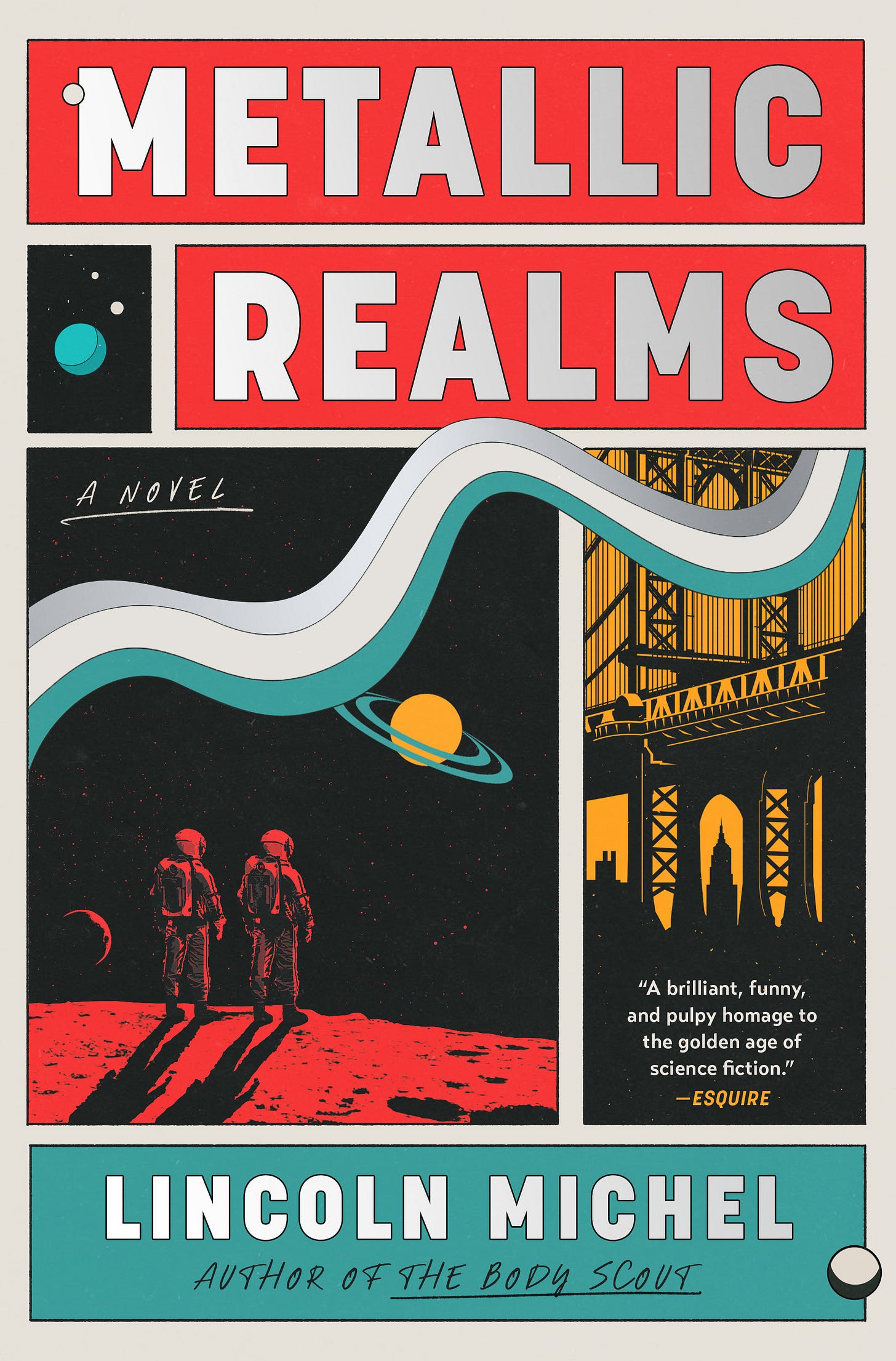Recently, I’ve been thinking about adverbs. Everyone hates adverbs. But I say they hate them foolishly and incorrectly. I called this newsletter Counter Craft because I wanted to offer counterintuitive craft advice. One of my earliest Counter Craft articles was titled “A Defense of Adverbs,” and I thought about that old post again when I saw some recent adverb discourse. I try not to repeat topics in this newsletter. However, since the initial adverb article is paywalled—I post all articles for free and then paywall older pieces for my lovely subscribers—and since it was literally posted my first week on Substack back in 2021 when I had very few followers, well, I hope you won’t mind me repeating myself.
Before I do that, let me remind you that my new novel Metallic Realms was just published this month! It’s getting great reviews, including a recent rave in the Substack-hosted The Bulwark. If you like satirical novels, science fiction, and/or novels about stumbling and bumbling writers then I hope you will check out Metallic Realms. And if you enjoy the novel, please consider reviewing on Amazon or Goodreads.
Now to move swiftly and vigorously back to adverbs. I’ve always bristled at the blanket ban on adverbs. They are a part of our language. We’re writers. Why would we want to limit ourselves by eliminating an entire part of speech from our toolkit? In my original post, I said:
“Avoid adverbs” is a common advice in MFA programs, undergrad composition classes, and commercial fiction writing guides. A quick google turns up articles like “Adverbs: The Death of Good Fiction Writing,” “Writing Tips: Abolish the Adverbs,” and “Stephen King on Writing, Fear, and the Atrocity of Adverbs.” (“I believe the road to hell is paved with adverbs, and I will shout it from the rooftops,” Stephen King says in his memoir On Writing.)
My current WIP has a bloviating, absurd narrator, and one thing I’ve been doing to create his voice is to allow myself go hog wild with adverbs. It’s going swimmingly! I’d forgotten how fun adverbs can be, and how much they can add to a sentence. And since the point of this newsletter is to counter traditional craft advice—thus Counter Craft—I’ll mount a defense of the much-abused adverb.
(Yes, that then “current WIP” is the now-released Metallic Realms!)
I go on to argue that when people say “avoid adverbs” they usually mean a specific class of -ly adverbs. Words like always, once, fast, down, tomorrow, and many other very common and necessary words can be adverbs. Few would say to never use those. But, it is true that many writers use adverbs inelegantly and wrongheadedly. Or to be more accurate, they are often used unthinkingly.
The main issue is that most writers use adverbs to pointlessly repeat information the reader already knows from the rest of the sentence or the verb itself. Bob ran quickly. Running is by definition a quick movement. Many early writers use adverbs this way: Allie grinned happily. Farah frowned sadly. Orhan screamed loudly. Etc. There are few reasons to say Bob ran quickly instead of just Bob ran or, perhaps better, Bob sprinted. But that doesn’t mean there aren’t ways to use adverbs to deepen or complicate your sentences.
What got me thinking diligently about adverbs again was an article by
. The Republic of Letters runs a series of point / counterpoint style takes on lit topics—the
anti-MFA take by is here—which I think is a smart and fun way for a series. (I contributed to this series just this week offering a qualified defense of “gatekeepers” in publishing)
In Puryear’s piece, there is this passage:
There’s your pre-packaging. Just one way in which your creative freedom is stifled, a product of a systematic, state-issued conveyor belt of bourgeoise schlock, a thing worth screaming about on the internet. Unfortunately, if you believe this, then you might also believe that “Kurt said angrily” is as strong as “Kurt said, trembling, red in the face,” and that’s just too bad.
And then I saw this rebuttal:
I hope these two writers don’t mind my riffing on their comments, because I think both are… correct.
Puryear’s comment on adverbs is an aside, but there are at least two craft lessons I’d draw from the example. (And yes, they are lessons I learned in an MFA program.) The first is that if your dialogue is strong and clear, you don’t need an adverb. If you write “Fuck you!” Kurt said angrily, you’re just giving the reader the same information twice. Kurt is mad. We can assume that from “Fuck you!” The second principle is the classic yet frequently misunderstood “show don’t tell.” The misunderstood part of “show don’t tell” is that many people—including some creative writing professors—have gotten the idea that “show don’t tell” means it is bad to ever have characters think about ideas, principles, politics, and such. No. That’s silly. But it is true that if you can get the same information across either by flatly telling it or by giving the reader a visual image, the latter is typically stronger. If the information is “Kurt is angry” then Kurt was angry is (in most circumstances) duller than Kurt said, trembling, red in the face.
As with anything in fiction, there are endless caveats. Sometimes you want a dull sentence as a beat between more dramatic ones, for example. Still, as a general principle, giving your reader something to see in a scene is better than just stating it.
At the same time, I agree with Kolding that everything depends on context and the writer’s style. And I also agree that the example “I love you,” he said angrily is exactly the way to use an adverb. We expect “I love you” to be said, well lovingly. We don’t expect it to be said angrily. The adverb complicates the verb, giving us new information and changing the meaning of the sentence. And in this case, I’d think “I love you,” he said, trembling, red in the face is a bit much.
This is a basic but IMHO useful principle for when to use an adverb. Is it changing our understanding of the verb? Cheryl cheered happily is redundant but Cheryl cheered sadly might be worth writing. Anton whispered quietly is less interesting than Anton whispered loudly. So on and so forth. Sure, you could “show” these instead of using adverbs—Cheryl cheered, tears streaming down her grimacing face—but often it is better to be brisk. It depends on context and style.
The above are obvious ways to complicate a verb with an adverb. There are many other ways to do it though. In my initial post, I gave an example from Denis Johnson’s classic Jesus’ Son that I’ll repeat here:
The man hanging out of the wrecked car was still alive as I passed, and I stopped, grown a little more used to the idea now of how really badly broken he was, and made sure there was nothing I could do. He was snoring loudly and rudely. His blood bubbled out of his mouth with every breath. He wouldn’t be taking many more.
“Snoring loudly and rudely.” Jesus’ Son has many moments of unexpected adverbs that both contribute to his unique style—Johnson also loves surprising adjectives—and are character indicating. Who else but a drugged-out fuckup like Fuckhead (that’s the narrator’s name) would see a dying man in a car crash and think he is snoring “rudely”?
Of course, Johnson also feels comfortable writing “really badly broken” in that same passage. Many teachers would slash that out of a manuscript, but it fits in well with Johnson’s casual yet poetic style. The one thing I’d argue is that Johnson surely thought about each word in his text. He was famous for it. He didn’t drop those adverbs unthinkingly, with the fingers reflexively hitting “happily” after “smiled.”
Use any and all adverbs if they work for you. Just make sure you are doing so with intention. There are no true rules in writing. Only useful principles with endless caveats. As always, write what sounds right to you.
If you like this Substack, please consider subscribing or checking out my new novel Metallic Realms. It is out in stores and getting great reviews: “Brilliant” (Esquire), “riveting” (Publishers Weekly), “hilariously clever” (Elle), “I left this book feeling … assured of the future of storytelling” (The Masters Review), and “Just plain wonderful” (Booklist). You can also read an excerpt of the novel in the excellent Substack magazine The Metropolitan Review.
.png)







